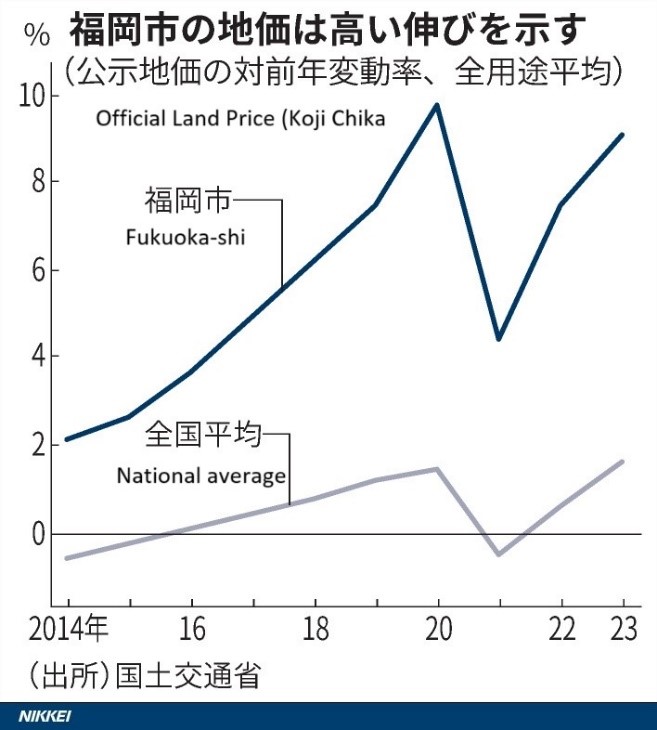Growing City, Fukuoka Rising Land Prices in Fukuoka Boost Finances: City Tax Revenue Hits a Record High of 370 Billion Yen
-
Fukuoka City's finances are thriving. In the fiscal year 2024, the city's tax revenue is expected to exceed 370 billion yen for the first time, thanks to rising land prices driven by population growth and redevelopment. With the increase in tax revenue, the city's debt per capita has decreased to less than half of its peak in fiscal year 2004, promoting fiscal health. While advancing debt repayment, the city will allocate funds to key areas such as child-rearing support and infrastructure development, accelerating urban growth.
-
“We will strengthen the financial foundation by increasing tax revenue and give back to citizens in the form of improved quality of life," emphasized Mayor Soichiro Takashima.
-

-
Fukuoka City's initial expenditure budget for the fiscal year 2024 is a record 1.0825 trillion yen in the general account. In the area of child-rearing support, the city will implement a pilot project for the national government's proposed "Universal Childcare Access Program (tentative name)." Additionally, the city will advance infrastructure development, including the redevelopment of the former Kyushu University Hakozaki Campus (in Higashi Ward) and increasing services on the municipal subway Nanakuma Line
-
The indispensable source for funding such unique projects is the general revenue, which has no spending restrictions and can be used for any expense. City taxes, which make up a significant portion of this revenue, are particularly important. The city's tax revenue for the fiscal year 2024 is expected to reach a record high of 370.6 billion yen, an increase of about 5 billion yen from the fiscal year 2023. This revenue will account for 34% of the overall revenue budget, including designated funds with specified uses.
-

-
The increase in fixed asset taxes levied on land and buildings is boosting city tax revenue. For the fiscal year 2024, this is expected to increase by 6% from the fiscal year 2023, reaching 144.1 billion yen. The underlying factor is the rise in land prices. According to the land price survey (official land prices) compiled by the Ministry of Land, Infrastructure, Transport and Tourism as of January 1, 2023, commercial land prices rose by 10.6%, and residential land prices rose by 8.0%, both increasing for the 11th consecutive year. The standard land prices (Rosenka) used for tax calculations are expected to show a similar increase.
-
In the city center, the construction of office buildings is accelerating under the redevelopment promotion initiatives "Tenjin Big Bang" and "Hakata Connected," anticipating business demand. Near Ohori Park, a popular relaxation spot for citizens, a luxury condominium complex with all units priced over 100 million yen has also been completed.
-
Corporate city tax, levied on corporations, is expected to increase by 1% to 37.2 billion yen, as the performance of the tourism and transportation industries recovers from the downturn caused by the COVID-19 pandemic. Although personal city tax will be limited to 132.9 billion yen, a 5% decrease due to a flat-rate tax reduction, the city’s finance bureau explains that "the number of taxpayers continues to increase, so there is no impact on the revenue base itself." Additionally, 11 billion yen in special local grants provided by the national government to compensate for the tax revenue decrease due to the flat-rate tax reduction will be incorporated into the general revenue.
-

-
Against the backdrop of increased tax revenue, debt repayment is also steadily progressing. In the fiscal year 2024, the amount of municipal bonds issued is expected to decrease by 10% to 60 billion yen, partly due to the reduction of "extraordinary financial countermeasure bonds" issued to supplement local government finances to nearly half of the fiscal year 2023 level. The municipal bond debt per capita is projected to be 900,000 yen, which is less than half of its peak in fiscal year 2004 (1.85 million yen).
-
In Fukuoka City, the population is expected to peak around 2040, reaching approximately 1.7 million, a 4% increase from 2023. However, the "Fiscal Management Plan," which outlines the city's basic financial management policies through fiscal year 2024 and was formulated in June 2021, points out that "while a significant increase in general revenue cannot be expected, social security costs and expenses for the renovation and repair of public facilities will increase, leading to a challenging situation in the near term."
-
"We must anticipate an eventual population decline and use the accelerator and brake with a delicate balance." Mayor Takashima speaks of the unique challenges in managing the finances of a city that is still growing. While increasing the city's vitality through redevelopment projects and startup support, it is also essential to secure funds to address the issues of a declining birthrate, an aging population, and aging infrastructure.
-
At Azuki Corporation we provide advice to find the best property based on our client’s request. We are here for you, please do not hesitate to contact us with any questions.
For real estate advice please press HERE